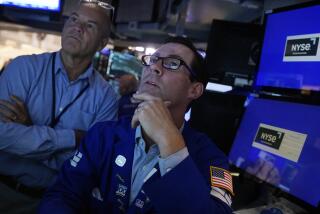Dow Gains 4.82 in Mixed Market : Concerns Over Inflation Keep Trading Pace Very Light
NEW YORK â Stock prices turned mixed Monday and trading tailed off to its slowest pace in six weeks in the aftermath of the marketâs recent selloff.
The Dow Jones index of 30 industrials, which had fallen 79.28 points last week, recovered 4.82 to 2,250.36.
But declining issues outnumbered advances by nearly 4 to 3 in nationwide trading of New York Stock Exchange-listed stocks.
Big Board volume totaled 139.90 million shares, down from 160.68 million Friday and the lightest total since a 117.38-million-share day on Jan. 16.
Stocks have been haunted by the specter of future interest rate hikes, which will push up corporate borrowing costs and lure investors away from equities with their high yields. The nationâs leading banks Thursday hiked their prime lending rates to 11.5% from 11%.
Inflation Concerns
While blue chips gained Monday as investors hunted for cheap purchases after last weekâs 79.28-point loss, bargain hunting will not boost the Dow in the long term, analysts said.
Stocks will continue to be depressed by concerns about inflation and higher interest rates to cool it, they added. The government reported Wednesday that consumer prices rose 0.6% last month--their highest monthly gain in two years.
âEssentially, weâre in the throes of a correction phase for a few weeks,â said Nikko Securities Co. Executive Vice President Jack Conlon.
Stocks drew strength Monday from firmer credit and currency markets.
âThe dollar and bonds firmed,â said William Raftery of Smith Barney, Harris Upham & Co., citing his reason for the dayâs rise in blue chips.
Raftery said the Dow is better off resting from its recent correction rather than making any sudden movements. âThat might be the best medicine here,â he said.
Analysts said that last weekâs decline was exacerbated by futures-related sell programs, which âappear to have run their course,â said Jerry Hinkle, trader at Sanford C. Bernstein Co.
Stocks will get future direction from todayâs report on fourth-quarter gross national product, which will shed more light on the economic expansion and its prospects for future inflation.
London Prices Fall
âIâm expecting a slowing down of the economy and lower interest rates in the second half of this year,â said analyst John Connolly of Dean Witter Reynolds Inc., adding that upcoming economic reports should show a tapering in the economyâs robust growth last month.
Blue chips attracting some bargain hunting buyers included International Business Machines, up 1/2 at 121 5/8; American Telephone & Telegraph, up 3/8 at 30 1/8; Texaco, up 3/4 at 51, and General Electric, up 3/4 at 46.
U.S. Shoe tumbled 5 3/4 to 20. Tradersâ expectations of a possible takeover or other transaction were chilled by news that the company agreed to sell its footwear division to a group headed by Merrill Lynch Capital Partners Inc.
Columbia Pictures gained 1 1/8 to 15 3/4 on revived takeover speculation.
Airline issues, which have been strong gainers in recent weeks, ran into selling. NWA, a subject lately of takeover talk, dropped 3 to 69 3/8; UAL fell 2 1/2 to 122 3/4; Delta Air Lines lost 1 5/8 to 55 1/8, and AMR dipped 7/8 to 59.
Liz Claiborne fell 1 to 17 1/8 as one of the most active issues in the over-the-counter market. The companyâs founders, Arthur and Elisabeth Claiborne Ortenberg, announced plans to retire in June.
The Wilshire index of 5,000 equities closed up 2,849.441, up 2.738.
The NYSEâs composite index of all its listed common stocks edged up 0.23 to 161.95.
Standard & Poorâs industrial index rose 0.91 to 332.24, and S&P;âs 500-stock composite index was up 0.69 at 287.82.
The NASDAQ composite index for the over-the-counter market dropped 1.02 to 398.94. At the American Stock Exchange, the market-value index closed at 321.42, down 0.07.
In foreign trading, prices closed lower on the Tokyo Stock Exchange. The Nikkei 225-share index fell 166.72 to 32,285.77.
Share prices on the London Stock Exchange fell substantially as dealers awaited January trade figures. Fears of higher interest rates contributed to the negative feeling, heightened by further steep declines in the British currency. At the close, the Financial Times 100-share index was down 22.8 at 1,996.7.
More to Read
Inside the business of entertainment
The Wide Shot brings you news, analysis and insights on everything from streaming wars to production â and what it all means for the future.
You may occasionally receive promotional content from the Los Angeles Times.










